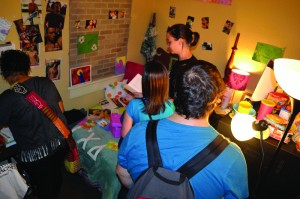
Ed Marlowe
Staff writer
Every nine seconds, a woman living in the United States will be battered by her husband, boyfriend or live-in partner. This and many other startling facts are shared at “Crazy in Love” hosted by the Women’s Center this week in Wrather Museum.
Students and faculty walk in the harrowing footsteps of Jenna McKowsky and Chris Ines, two fictitious students who fell desperately in love but did not live happily ever after.
Their stories unfold in the confines of a self-guided, room-by-room exhibit showing the progression of dating violence and the red flags associated with domestic abuse.
Each room presents an interactive snapshot of the budding relationship, using video blogs, written journals and theatrical staging to show the dangers of ignoring signs of abuse in a relationship.
Co-coordinators Sarah Wang and Amy Anglin, student volunteers at the Women’s Center, created Jenna and Chris using personal accounts of abuse victims, but added twists to their stories to make their lives fictional.
“This program has a very ‘Law and Order’ sort of feel to it,” Anglin said.
Wang said she gains satisfaction knowing there is a program that reaches out and allows people to share their experiences.
“What people say to me afterward, and the comments they leave on the comment board, it’s really worth it to me,” Wang said.
Those comments, she said, help the Women’s Center create more realistic scenarios and programs for the future.
“As much as we’re trying to educate others, we are educated when people share their comments and stories with us,” she said.
Jane Etheridge, director of the Women’s Center, shed light on how the program has developed over the years.
“Whenever I did a domestic violence program in the past, people always kept asking ‘What is wrong with these women who stay in these situations?’” Etheridge said.
Tired of hearing the blame being shifted toward women, Etheridge set out to find a way to exhibit the signs of abuse in a convincing manner. It took a breakthrough in previous schools of thought to reach out to victims and educate people effectively on the signs of domestic violence, she said.
“We had to figure out a program that showed that hitting is way on down the road in an abusive relationship,” Etheridge said. “Jealousy, obsessiveness, isolation and coercion are all signs, and women are just hammered down and verbally and psychologically abused until nothing is left.”
Walking through a person’s life over the course of six months to a year, she said, is the best way to show visceral results of constant domestic abuse and the toll it takes on a woman’s psyche.

“In abusive relationships, the red flags just keep mounting and mounting and it’s getting harder and harder until women cannot escape the pressure,” she said.
“Crazy in Love” has accompanying exhibits called “The Clothesline Project” and “Gone, But Not Forgotten.” “The Clothesline Project” showcased T-shirts created by survivors of domestic violence, while “Gone, But Not Forgotten” memorialized 98 women in Kentucky who have died to domestic violence injuries since 2008.
Upon finishing the five-room walkthrough of the relationship between Jenna and Chris, students were met with signs and pamphlets on domestic violence provided by the volunteers.
Etheridge said domestic abuse is on the rise in the local area and awareness of the problem is more necessary than ever.
“When the economy goes down, alcohol consumption increases,” she said. “When that happens, you better believe domestic abuse increases.”
An anonymous quote left on the comment board sums up everything the program tried to explain to visitors.
“If you really loved me, you wouldn’t put your hands on me,” it read.
If you or anyone you know suffers from domestic violence, contact the Women’s Center at 809-3140 or the Merryman House Domestic Crisis Center in Murray at 759-2373.
Contact Marlowe